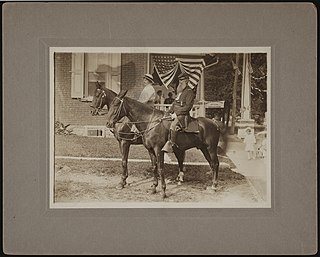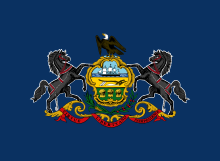
The Battle of Hoke's Run, also known as the Battle of Falling Waters or Battle of Hainesville, took place on July 2, 1861, in Berkeley County, Virginia as part of the Manassas campaign of the American Civil War. Notable as an early engagement of Confederate Colonel Thomas J. Jackson and his Brigade of Virginia Volunteers, nineteen days before their famous nickname would originate, this brief skirmish was hailed by both sides as a stern lesson to the other. Acting precisely upon the orders of a superior officer about how to operate in the face of superior numbers, Jackson's forces resisted General Robert Patterson's Union forces briefly and then slowly retreated over several miles.

The 4th Pennsylvania Reserve Regiment, also known as the 33rd Pennsylvania Volunteer Infantry Regiment, was an infantry regiment that served in the Union Army during the American Civil War. It was a part of the famed Pennsylvania Reserves in the Army of the Potomac for much of the early part of the war and served in the Eastern Theater in several important battles, including Antietam and Fredericksburg.
The 54th Pennsylvania Volunteer Infantry was an infantry regiment which served in the Union Army during the American Civil War.

The 46th Pennsylvania Volunteer Infantry was a Union Army regiment in the American Civil War. It served in both the Eastern and Western Theaters, most notably at the 1862 Battle of Cedar Mountain and during the 1864 Atlanta Campaign. During the war, the regiment lost 17% of its strength through combat losses and disease.
The 7th Pennsylvania Reserve Regiment, also known as the 36th Regiment Pennsylvania Volunteer Infantry, was a regiment in the Union Army during the American Civil War. It formed part of the Pennsylvania Reserve division in the Army of the Potomac for most of the war. The regiment served in a number of important battles throughout the Eastern Theater, including Antietam and Fredericksburg.
The 2nd Pennsylvania Cavalry was a cavalry regiment that served in the Union Army during the American Civil War.

The 8th Pennsylvania Cavalry was a cavalry regiment that served in the Union Army during the American Civil War.

The 1st Pennsylvania Infantry was an infantry regiment in the Union Army during the American Civil War that served for three months at the beginning of the war.

The 4th Pennsylvania Infantry Regiment, officially known as the 4th Regiment, Pennsylvania Volunteer Infantry, was an infantry regiment of the Union Army in the American Civil War. Formed mostly from a militia unit in Norristown in southeastern Pennsylvania, the regiment enlisted at the beginning of the American Civil War in April 1861 for a three-month period of service under the command of Colonel John F. Hartranft. Logistical difficulties bedeviled the regiment, which served as part of the garrison of Washington, D.C., until late June, when it was sent into Northern Virginia to join in the army of Brigadier General Irvin McDowell.

The 2nd Pennsylvania Reserve Regiment also known as the 31st Pennsylvania Volunteer Infantry was an infantry regiment that served in the Union Army as part of the Pennsylvania Reserves infantry division during the American Civil War.

The 1st Pennsylvania Reserve Regiment, also known as the 30th Pennsylvania Volunteer Infantry, was a regiment in the Union Army during the American Civil War. It was a part of the famed Pennsylvania Reserve division in the Army of the Potomac for much of the war, and served in the Eastern Theater in a number of important battles, including Antietam, Fredericksburg, and Gettysburg.
The 9th Pennsylvania Reserve Regiment also known as the 38th Pennsylvania Volunteer Infantry was an infantry regiment that served in the Union Army as part of the Pennsylvania Reserves infantry division during the American Civil War.
The 131st Pennsylvania Volunteer Infantry was an infantry regiment that served in the Union Army during the American Civil War.

The 45th Pennsylvania Volunteer Infantry was an infantry regiment that served in the Union Army during the American Civil War.
The 51st Pennsylvania Volunteer Infantry was an infantry regiment that served in the Union Army during the American Civil War.

The 12th Regiment Pennsylvania Volunteer Infantry was an infantry regiment of the Union Army in the American Civil War. Raised in Pittsburgh and its surrounding counties in April 1861 for three months of service, the regiment spent its first month in training, then guarded the Northern Central Railway in Maryland until it was mustered out. Many of its men went on to serve in subsequent Pennsylvania regiments during the war.

William Henry Egle (1830–1901) was a physician, author and historian who served as the State Librarian of the Commonwealth of Pennsylvania from 1887 to 1889. A practicing physician at the dawn of the American Civil War, he was initially commissioned as an assistant surgeon, and then served as a surgeon with several different Union Army regiments during the course of the conflict, including the 116th Regiment Infantry, U.S. Colored Troops (USCT).

The 172nd Pennsylvania Infantry was an infantry regiment in the Union Army during the American Civil War.

The 5th New York State Militia was a New York State militia, organized in 1861 in New York City, under Colonel C. Schwarzwaelder, Lieutenant Colonel Louis Burger and Major George Van Amsberg. The regiment's primary language was German. It offered its services to the state on 16 April 1861. Although the regiment was originally organized as artillery, it was assigned to the infantry.

The 24th Pennsylvania Volunteer Infantry was a three-month infantry regiment that served in the Union Army during the American Civil War.











